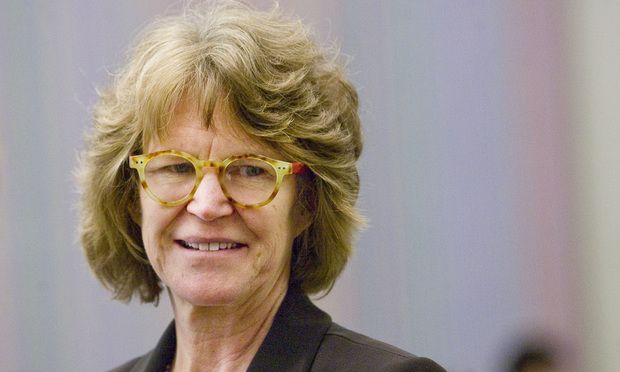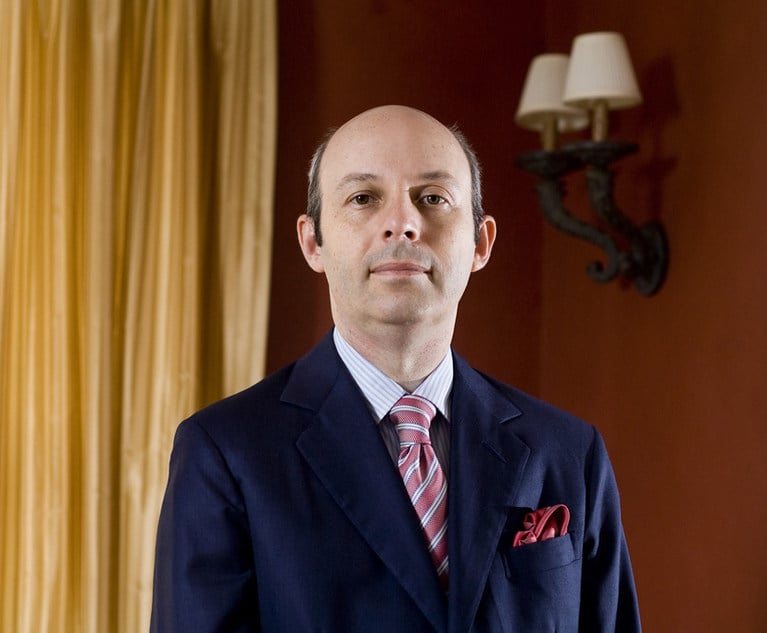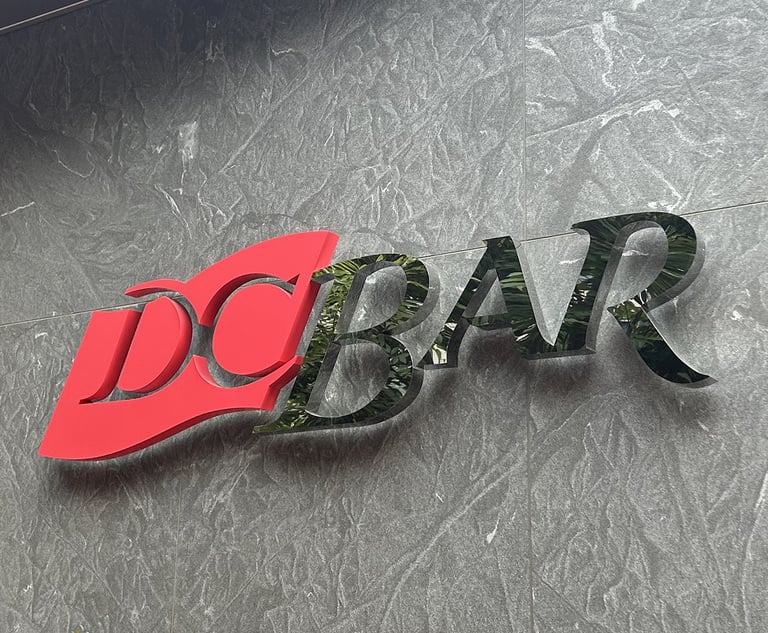Departing UDC Law Dean Says Job Offers a Bully Pulpit for Justice
After 20 years in the job, Katherine "Shelley" Broderick will step down as dean of the University of the District of Columbia David A. Clarke School of Law this summer.
January 30, 2018 at 01:20 PM
3 minute read
 Katherine Broderick. Photo Credit: Diego M. Radzinschi/ALM
Katherine Broderick. Photo Credit: Diego M. Radzinschi/ALM Katherine “Shelley” Broderick, who for the past two decades has served as dean of the University of the District of Columbia David A. Clarke School of Law, will step down from that post this summer.
Broderick announced her departure Monday, saying in a message to the law school community that the decision to leave the deanship was difficult but the “time is right.”
Her deanship is notable not only for its length—she will have been dean for 20 years at a time when the average law deanship hovers around four years—but also for her status among the early wave of women law deans and her political activism, a role many of her dean colleagues shy away from.
“I've always loved the opportunity to have a bully pulpit,” said Broderick in an interview Tuesday. “This is a dream job at a dream time, when we can move the needle toward ending poverty and inequality. I think if we don't do that, it's a lost opportunity.”
Broderick, a past president of the American Civil Liberties Union of the District of Columbia, announced that students could delay their final exams for a day in May 2015 if they provided legal support for people protesting the death of Freddie Gray, who died in custody of Baltimore police. Broderick said in 2013 that she and the law school faculty had discussed continuing to teach their classes amid that year's federal government shutdown as an “act of civil disobedience.” (It's the only public law school in the District of Columbia, where the federal government controls spending, but it was never forced to close during the shutdown.)
“Generally, I think this is a law school for people who see injustice and want to change that, and want to work toward making the world a fairer and more just place,” she said.
Broderick said she will take a sabbatical from the law school then return to teaching.
She began contemplating leaving the deanship in 2014, but felt she should stay on during the school's reaccreditation bid in the 2015-16 academic year. The school was fully reaccredited by the American Bar Association in April. Moreover, a strong administration and faculty means the school will be in good hands, she said.
“They are all advocates for justice,” Broderick said. “They are real lawyers, great scholars and exceptional teachers. They are the faculty members who go, with students, to Dulles [International] Airport when the Muslim ban is announced.”
University president Ronald Mason Jr. said in a letter to the law school community that Broderick has been a champion of the school's dual mission to give traditionally underrepresented students access to a legal education and to serve low-income residents.
“Under Shelley's exemplary leadership, UDC Law has educated more than 2,000 diverse and committed students, and represented thousands of vulnerable individuals and communities through the school's legal clinics over the last 20 years,” Mason wrote.
This content has been archived. It is available through our partners, LexisNexis® and Bloomberg Law.
To view this content, please continue to their sites.
Not a Lexis Subscriber?
Subscribe Now
Not a Bloomberg Law Subscriber?
Subscribe Now
NOT FOR REPRINT
© 2025 ALM Global, LLC, All Rights Reserved. Request academic re-use from www.copyright.com. All other uses, submit a request to [email protected]. For more information visit Asset & Logo Licensing.
You Might Like
View All
SCOTUSblog Co-Founder Tom Goldstein Misused Law Firm Funds, According to Federal Indictment
2 minute read
'Lack of Independence' or 'Tethered to the Law'? Witnesses Speak on Bondi
4 minute read
DC Bar’s Proposed Anti-Discrimination, Harassment Conduct Rule Sees More Pushback

Full 8th Circuit Hears First Amendment Challenge to School District’s ‘Equity Training’
Trending Stories
- 1Judge Rejects Walgreens' Contractual Dispute Against Founder's Family Member
- 2FTC Sues PepsiCo for Alleged Price Break to Big-Box Retailer, Incurs Holyoak's Wrath
- 3Greenberg Traurig Litigation Co-Chair Returning After Three Years as US Attorney
- 4DC Circuit Rejects Jan. 6 Defendants’ Claim That Pepper Spray Isn't Dangerous Weapon
- 5Quiet Retirement Meets Resounding Win: Quinn Emanuel Name Partner Kathleen Sullivan's Vimeo Victory
Who Got The Work
J. Brugh Lower of Gibbons has entered an appearance for industrial equipment supplier Devco Corporation in a pending trademark infringement lawsuit. The suit, accusing the defendant of selling knock-off Graco products, was filed Dec. 18 in New Jersey District Court by Rivkin Radler on behalf of Graco Inc. and Graco Minnesota. The case, assigned to U.S. District Judge Zahid N. Quraishi, is 3:24-cv-11294, Graco Inc. et al v. Devco Corporation.
Who Got The Work
Rebecca Maller-Stein and Kent A. Yalowitz of Arnold & Porter Kaye Scholer have entered their appearances for Hanaco Venture Capital and its executives, Lior Prosor and David Frankel, in a pending securities lawsuit. The action, filed on Dec. 24 in New York Southern District Court by Zell, Aron & Co. on behalf of Goldeneye Advisors, accuses the defendants of negligently and fraudulently managing the plaintiff's $1 million investment. The case, assigned to U.S. District Judge Vernon S. Broderick, is 1:24-cv-09918, Goldeneye Advisors, LLC v. Hanaco Venture Capital, Ltd. et al.
Who Got The Work
Attorneys from A&O Shearman has stepped in as defense counsel for Toronto-Dominion Bank and other defendants in a pending securities class action. The suit, filed Dec. 11 in New York Southern District Court by Bleichmar Fonti & Auld, accuses the defendants of concealing the bank's 'pervasive' deficiencies in regards to its compliance with the Bank Secrecy Act and the quality of its anti-money laundering controls. The case, assigned to U.S. District Judge Arun Subramanian, is 1:24-cv-09445, Gonzalez v. The Toronto-Dominion Bank et al.
Who Got The Work
Crown Castle International, a Pennsylvania company providing shared communications infrastructure, has turned to Luke D. Wolf of Gordon Rees Scully Mansukhani to fend off a pending breach-of-contract lawsuit. The court action, filed Nov. 25 in Michigan Eastern District Court by Hooper Hathaway PC on behalf of The Town Residences LLC, accuses Crown Castle of failing to transfer approximately $30,000 in utility payments from T-Mobile in breach of a roof-top lease and assignment agreement. The case, assigned to U.S. District Judge Susan K. Declercq, is 2:24-cv-13131, The Town Residences LLC v. T-Mobile US, Inc. et al.
Who Got The Work
Wilfred P. Coronato and Daniel M. Schwartz of McCarter & English have stepped in as defense counsel to Electrolux Home Products Inc. in a pending product liability lawsuit. The court action, filed Nov. 26 in New York Eastern District Court by Poulos Lopiccolo PC and Nagel Rice LLP on behalf of David Stern, alleges that the defendant's refrigerators’ drawers and shelving repeatedly break and fall apart within months after purchase. The case, assigned to U.S. District Judge Joan M. Azrack, is 2:24-cv-08204, Stern v. Electrolux Home Products, Inc.
Featured Firms
Law Offices of Gary Martin Hays & Associates, P.C.
(470) 294-1674
Law Offices of Mark E. Salomone
(857) 444-6468
Smith & Hassler
(713) 739-1250










